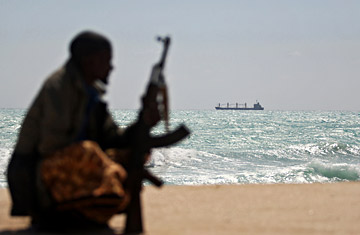
An armed pirate looks at a cargo ship anchored offshore in northeastern Somalia
The pirate is sitting in the backseat of my car. We're parked in the basement lot of a Nairobi mall, and the Muzak version of Celine Dion's "My Heart Will Go On" echoes across the concrete. The man, who calls himself Ahmad, tells me he helped hijack six ships off the coast of Somalia before he quit the trade in November because his wife left him for another pirate. I met Ahmad in mid-March at a restaurant in Eastleigh, a Nairobi neighborhood dominated by Somalis. He came with another ex-pirate, named Bashir, who bared his black, rotten teeth every time he smiled. Bashir and Ahmad sipped strawberry milk shakes through long straws.
Bashir was once a fisherman. The pirates hired him because he knew how to swim--a valuable skill he could teach other recruits. Bashir claimed he was among the pirates who hijacked the MV Faina, a ship carrying 33 Soviet-era battle tanks to Kenya, on Sept. 25, 2008. He fled Somalia after that job, he says, because he fell out with the pirate leaders over pay. Bashir earned $6,000, but his bosses deducted two-thirds to cover the food he ate during the operation. "We are the ones out on the water taking all the risks and suffering," Bashir says. "That was how our differences began. I feared that because I disagreed with the boss about money, they would assassinate me."
When Somali piracy hit the headlines in 2008, the first crop of stories told of young pirates who had struck it rich. They bought expensive cars and houses. But evidence coming out of Somalia indicates that criminal syndicates with financiers and investors based in Dubai, London and Mombasa, Kenya, have taken over piracy in The Horn of Africa. The warlords at the top grab almost all the money and pay the men at the bottom next to nothing. The pirates caught on camera bobbing in their skiffs are the high-seas equivalent of the Mafia's lowliest associates. "The people being arrested are actually foot soldiers," says Dickson Oruku Nyawinda, a lawyer who represents accused Somali pirates in Kenya's jails. "They are not the real pirates."
The U.N. Monitoring Group on Somalia provided some illuminating details in a February report. It describes a corporate system in which pirates may be fined $500 for entering their bosses' offices without permission. On the flip side, pirates can earn rewards of several thousand dollars for good behavior. According to the report, the rank and file receive $15,000 each for their role in hijacking a ship. But pirates who have fled Somalia for Nairobi say that figure is much inflated. Ahmad said he might get a $10,000 share, but his bosses would withhold as much as half of that to pay for his expenses. "The big fish are the guys who lead us, the ones who invest in the equipment--the boat, those things," he says. "Whether we die or not, they don't care."
The inequities are easy to see among those suspects who were arrested on piracy charges and are now being held in Kenyan prisons. They are generally illiterate young men who have no say in the operations they join and don't even know how much ransom gets paid for the ships they hijack. "They don't have a leader as such," says Nyawinda. "When I go visit them in jail, one may know Swahili more than the others. Whoever among them understands more becomes the leader."
